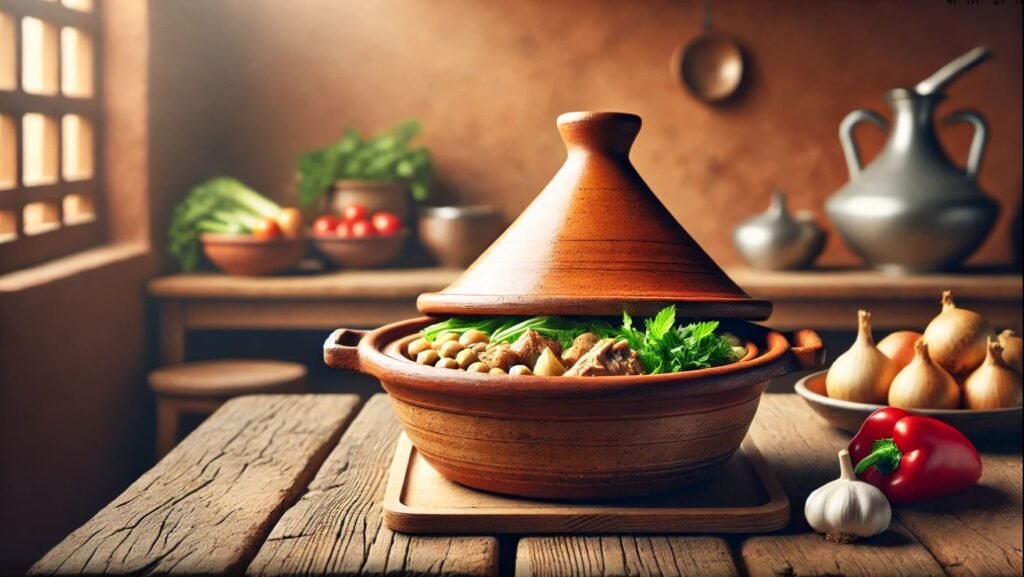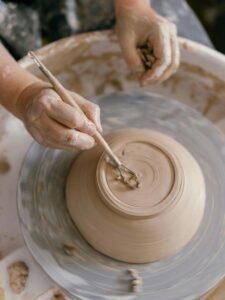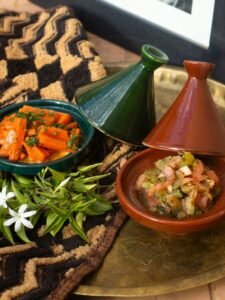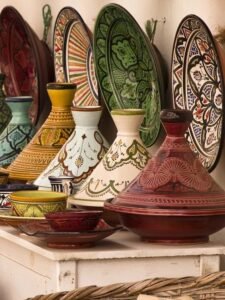
The Handmade Moroccan Tajine stands as one of the most iconic symbols of Moroccan cuisine and craftsmanship. Steeped in history, each tajine tells the story of artisans who, for centuries, have honed their skills to create these unique clay pots. From the bustling souks of Marrakech to the small mountain villages, artisans shape and bake these timeless pieces with care, transforming humble clay into culinary art. The tajine’s beauty lies not just in its design, but in its role as a vessel that brings people together around a meal.
The Origins of the Handmade Moroccan Tajine

The history of the Handmade Moroccan Tajine dates back to the Berber tribes of North Africa. For centuries, they used these clay pots to prepare slow-cooked meals that would feed entire families. The tajine’s unique conical shape allows food to steam and cook evenly, creating tender and flavorful dishes. While many associate it with Morocco today, the tajine’s influence spans across the Maghreb region, where it remains a culinary staple.
Handmade by skilled artisans, these tajines are more than just cookware. They symbolize a way of life, a tradition passed down through generations. Each one reflects the cultural richness and resourcefulness of the Moroccan people. With techniques and designs varying from region to region, every tajine tells a unique story. Whether plain or intricately decorated, they remain rooted in the same timeless purpose.
The tajine’s evolution has mirrored Morocco’s own cultural shifts. While the essential design has remained consistent, modern artisans have begun experimenting with new colors, patterns, and even materials. Yet, despite these changes, the heart of the Handmade Moroccan Tajine remains unchanged—a functional and symbolic representation of the fusion between artistry and culinary tradition, continuing to connect families through shared meals and timeless flavors.
Craftsmanship Behind the Handmade Moroccan Tajine

The process of creating a Handmade Moroccan Tajine is both labor-intensive and intricate. It begins with sourcing the right clay, often from local regions known for their high-quality materials. Artisans then mold the clay by hand, shaping the base and lid with precision and skill. Each piece requires careful attention, as the balance between the lid and the base is key to ensuring the perfect cooking environment.
Once shaped, the tajines are left to dry in the sun before undergoing firing in traditional kilns. This baking process is critical as it hardens the clay and enhances its durability. The result is a robust yet beautiful piece of cookware, capable of withstanding high heat and long hours of cooking. Some tajines are left in their natural state, while others are hand-painted with stunning designs, adding a decorative touch to their functionality.
The artistry behind these tajines lies not just in their creation but in the respect artisans have for their craft. Each artisan works with the knowledge that they are not just making a pot; they are preserving a tradition that stretches back centuries. The handmade nature of each tajine ensures that no two are ever exactly alike.
Culinary Significance of the Moroccan Tajine

The Handmade Moroccan Tajine is not just a cooking tool; it is an essential part of Morocco’s culinary identity. Tajine dishes are slow-cooked to perfection, allowing the flavors of spices, meats, and vegetables to meld together in a rich, aromatic blend. Meals cooked in these traditional pots are deeply flavorful, thanks to the tajine’s ability to lock in moisture and heat evenly.
In Moroccan households, tajines often serve as the centerpiece of meals, shared among family and friends. The clay pots are brought directly from the fire to the table, where the lid is lifted to reveal a deliciously simmering dish. Whether it’s a lamb, chicken, or vegetable tajine, the experience of eating from a tajine is communal and celebratory.
The versatility of the Handmade Moroccan Tajine also allows for experimentation with flavors. From spicy harissa to sweet dried fruits, the ingredients used in tajines vary widely, making it a canvas for both traditional and modern recipes. However, regardless of the dish, the tajine always ensures a meal that is comforting, flavorful, and filled with the warmth of Moroccan hospitality.
The Cultural Value of the Moroccan Tajine

Beyond its culinary role, the Handmade Moroccan Tajine carries deep cultural significance. It is a symbol of hospitality and the Moroccan way of life, where food plays a central role in bringing people together. To give or receive a handmade tajine as a gift is to offer a piece of Moroccan heritage, one that embodies warmth, generosity, and tradition.
The use of tajines also extends beyond meals. In Morocco, they serve as a bridge between the past and the present, reminding the modern world of ancient cooking methods that continue to influence contemporary cuisine. The tajine is a cultural heirloom, passed down from generation to generation, with each family cherishing their own techniques and recipes.
Artisans who craft these tajines often do so within the context of small, family-owned workshops. For many, this craft represents not just a source of income but a way to honor their ancestors. The dedication to preserving this tradition is evident in every detail of the process, from shaping the clay to the final kiln firing. The Handmade Moroccan Tajine stands as a testament to the enduring legacy of Moroccan artisanship.
Choosing Your Own Handmade Moroccan Tajine

Selecting a Handmade Moroccan Tajine means choosing a piece of history and craftsmanship. When purchasing one, consider not only its functionality but also its origin. Each region of Morocco has its own style and method of making tajines, giving you a wide range of designs and sizes to choose from.
Some tajines are more decorative, intended for display or occasional use, while others are crafted specifically for everyday cooking. Regardless of the style, owning a tajine connects you to Morocco’s rich culinary and artisan traditions. The rustic charm and practicality of these clay pots make them a must-have for anyone who values authentic craftsmanship and timeless cooking methods.
Ultimately, the Handmade Moroccan Tajine is more than just a cooking vessel. It’s a piece of Moroccan history, a cultural symbol, and an artistic masterpiece. With every use, it brings the flavors and traditions of Morocco into your home, making each meal a journey into the heart of Moroccan culture.




